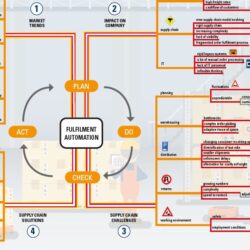Slow rate of digitization hinders strategic focus among procurement managers

More than half (51%) of procurement and supplier management processes have yet to be digitized. This is having a major impact on the ability of procurement teams to work on strategic tasks. According to a new survey by procurement software provider Ivalua, a lack of digitization limits companies’ ability to make fast, informed decisions about their suppliers. It also leads to inefficiencies.
The survey reveals that half (50%) of procurement managers worldwide believe that digitization is moving too slow within procurement. Meanwhile, 47% say that existing procurement systems are not flexible enough to keep up with constant change and deal with market and economic uncertainty.
Manual processes
Procurement teams around the world estimate that each year they waste more than one-fifth (22%) of their time dealing with paper-based or manual processes. In the Netherlands, this percentage is slightly lower at 17%. In addition, about one in three Dutch companies agree that a lack of digitization is preventing companies from addressing rising inflation and costs (36%) and makes it almost impossible to attract and retain talent (32%).
“Companies are wasting millions in staff time each year on manual processes. This is bogging down in low-value tasks, limiting their ability to focus on more strategic priorities,” comments Alex Saric, smart procurement expert at Ivalua. “Given inflation remains high and the economic outlook uncertain, it’s never been more important to digitize procurement processes, and free up teams to tackle these challenges.”
Solid data foundation
Furthermore, the survey found that 85% of organizations have implemented or plan to implement data analytics within procurement and supplier management function. A further 63% say they have already implemented or plan to implement AI or machine learning technology. Only 30% are “very confident” in the quality and accessibility of their supplier data when it comes to supporting effective procurement.
Additionally, among other ways to transform their procurement and supplier management, companies are implementing full end-to-end source-to-pay platforms (72%) that can help better manage their spend and suppliers, chatbots (63%) that help users to make better-informed purchasing decisions, blockchain technology (56%) that can improve provenance when purchasing goods, and Robotic Process Automation (RPA) (55%) that can reduce reporting time and assist with contract and category management.
Catalyst for procurement transformation
“AI can be the catalyst for procurement transformation, with clear use cases for processing data, driving automation, creating actionable insights, and informing strategies to augment procurement and supply chain operations,” Saric continues. “But poor-quality data will limit the insights produced by AI. Organizations need to walk before they can run, and this starts with digitization. This means taking a cloud-based approach to procurement that builds a solid data foundation that will inform decision making and reduce the risk of ‘garbage in, garbage out’.”
The survey was conducted in July 2023 among a total of 850 procurement leaders in the UK (250), the USA (250), Germany (100), France (100), Sweden (50), the Netherlands (50) and Italy (50).










